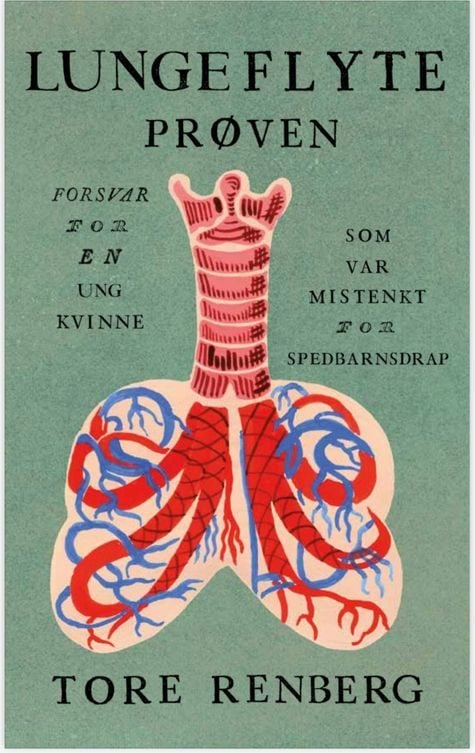#1 on Adresseavisen’s 10 best books of 2023 list
“Renberg immediately hooks his readers. He brings historical figures to life with a love for personal detail and precision.”
NDR Kultur, Germany
“Tore Renberg’s brick of a novel about a trial in 1680s Leipzig tells a compelling story of what the great men thought – and what the common people experienced … It is long and nerdy in a good way and captivating in an even better way. And the writing is an achievement of the highest order”
Hans Peter Madsen, Atlas, Denmark
“A completely un-Norwegian novel—grotesque and lavish. In a magical way, the reader is transported to the 17th century. Political undertones resonate, apropos to the abortion debate. This uproarious literary feast leaves behind a seriousness not easily shaken off.”
Aftenposten, 10 best books of 2023
“A captivating narrative … The result is diverse, convincing, entertaining, and overwhelming, firmly held together by Renberg’s superb overview and skilled pen.”
Sigmund Jensen, Stavanger Aftenblad, best books of 2023
“When Tore Renberg is good, he is unparalleled. And he is in this macabre historical novel set in Saxony in 1681, revolving around 15-year-old Anna Voigt, accused of killing her newborn child.”
Cathrine Krøger, Dagbladet, the 3 best books of 2023
“The book for anyone with an appreciation for everyday joys, sorrows, unrestrained desires, and the clash between science and theology in 17th-century Germany. A thrilling and enlightening literary feast.
Marius Wulfsberg, Dagbladet, the 3 best books of 2023
“Who would have thought that a historical novel about a young girl from the 17th century would offer one of this year’s most adventurous literary journeys? The Lung Float Test is Tore Renberg’s first attempt at a historical novel, and even though he has thoroughly researched his sources, he also allows himself a sea of imagination. Particularly of the grotesque kind. A FANTASTIC book!”
Oda Faremo Lindholm, VG, 3 best books of 2023
“The Lung Float Test is a literary feast where Tore Renberg convincingly portrays an important episode in European cultural and legal history that was in danger of being forgotten. It’s about the late 17th century in Saxony, about natural law and the fight against miscarriages of justice and torture. The jurist Christian Thomasius, one of Holberg’s heroes, plays a colorful leading role in it all. Another delightful surprise from Renberg!”
Rolf Nøtvig Jacobsen, Vårt Land, 3 best books of 2023
“Balances impressively. Excellently delivered historical novel. Even if it’s dark, it’s definitely worth the discomfort.”
Maria Årolilja Rø, Most powerful book of 2023
“The Lung Float Test is a triumph of a book … a page-turner about crime and punishment … an exhilarating literary feast that, page after page, increases in tension, drama, and remarkable fates.
Marius Wulfsberg, Dagbladet, 6/6 stars
“An outstanding historical novel … The result is impressive, not to mention overwhelming.”
Sigmund Jensen, Stavanger Aftenblad, 6/6 stars
“A macabre literary feast … it feels as if the lives depicted from over 300 years ago truly come alive … A historical adventure journey with clear links to contemporary political debates . There’s really nothing else to do than let yourself be carried away.
Oda Faremo Lindholm, VG, 6/6 stars
“A brilliant novel about the final convulsions of the Inquisition. … Rich, lavish, generous. A flourishing time portrayal that holds nothing, nothing, back? Perhaps a bit too long? No, it’s just very good. … a narrative that is captivating on all levels. Funny, tragic, and in the spirit of the Enlightenment: Enlightening.”
Fartein Horgar, Adresseavisen, 6/6 stars
“This unruly historical novel is a powerful accomplishment that renews the author’s body of work … refreshing. With the theatrical stylistic principles of the Baroque era, he blends intellect and emotion, comedy and irony. The Lung Float Test stages the hidden drama of history. The dilemmas and tension bring the long-forgotten individuals to life in a captivating manner.”
Astrid Fosvold, Vårt Land
“Quite possibly his very best novel. Brutal, teeming, and full of energy.”
Leif Bull, Dagens Næringsliv
“The ability to evoke fear and compassion for this girl who – probably – is wrongfully accused of infanticide, before the narrative shifts into a revenge novel, where we sympathize with the father’s thirst for retaliation and desperate longing for his daughter. All composed as elegantly as a fugue by Bach.”
Knut Hoem, NRK
“The Lung Float Test can be interpreted as a timeless story about countless Anna Voigts, who experience their bodies becoming a battleground for patriarchy and distorted religion. This boisterous literary feast leaves behind a seriousness that isn’t easily shaken off.”
Ingunn Økland, Aftenposten
“A novel that seems to encompass almost everything – ranging from gothic horror and terror to contemplative philosophical novel. However, it’s the story of Anna Voigt and her fate that truly resonates … exceptional entertainment. A brilliantly well-written example of the successful reconciliation of documentary, biography, and poetic imagination.”
Turid Larsen, Dagsavisen

